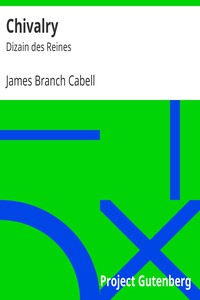The Certain Hour (Dizain des Poëtes) by James Branch Cabell (read 50 shades of grey TXT) 📖

- Author: James Branch Cabell
Book online «The Certain Hour (Dizain des Poëtes) by James Branch Cabell (read 50 shades of grey TXT) 📖». Author James Branch Cabell
He laughed. "It is a bargain. We will agree that I bereave some person of either stolen or unearned property, say, to the value of L10,000——" And with his usual carefulness in such matters, Mr. Sheridan entered the wager in his notebook.
She yielded him her hand in token of assent. And he, depend upon it, kissed that velvet trifle fondly.
"And now," said Mr. Sheridan, "to-morrow we will visit Bemerside and obtain possession of that crystal which is in train to render me the happiest of men. The task will be an easy one, as Eiran is now in England, and his servants for the most part are my familiars."
"I agree to your proposal," she answered. "But this diamond is my allotted quarry; and any assistance you may render me in procuring it will not, of course, affect in any way our bargain. On this point"—she spoke with a break of laughter—"I am as headstrong as an allegory on the banks of the Nile."
"To quote an author to his face," lamented Mr. Sheridan, "is bribery as gross as it is efficacious. I must unwillingly consent to your exorbitant demands, for you are, as always, the irresistible Ogle."
Miss Ogle bowed her gratitude; and, declining Mr. Sheridan's escort, for fear of arousing gossip by being seen upon the street with him at this late hour, preferred to avoid any appearance of indecorum by climbing down the kitchen roof.
When she had gone, Mr. Sheridan very gallantly attempted a set of verses. But the Muse was not to be wooed to-night, and stayed obstinately coy.
Mr. Sheridan reflected, rather forlornly, that he wrote nothing nowadays. There was, of course, his great comedy, Affectation, his masterpiece which he meant to finish at one time or another; yet, at the bottom of his heart, he knew that he would never finish it. But, then, deuce take posterity! for to have written the best comedy, the best farce, and the best burlesque as well, that England had ever known, was a very prodigal wiping-out of every obligation toward posterity. Boys thought a deal about posterity, as he remembered; but a sensible man would bear in mind that all this world's delicacies—its merry diversions, its venison and old wines, its handsomely-bound books and fiery-hearted jewels and sumptuous clothings, all its lovely things that can be touched and handled, and more especially its ear-tickling applause—were to be won, if ever, from one's contemporaries. And people were generous toward social, rather than literary, talents for the sensible reason that they derived more pleasure from an agreeable companion at dinner than from having a rainy afternoon rendered endurable by some book or another. So the parliamentarian sensibly went to bed.
Miss Ogle during this Scottish trip was accompanied by her father, the venerable Dean of Winchester. The Dean, although in all things worthy of implicit confidence, was not next day informed of the intended expedition, in deference to public opinion, which, as Miss Ogle pointed out, regards a clergyman's participation in a technical felony with disapproval.
Miss Ogle, therefore, radiant in a becoming gown of pink lute-string, left Edinburgh the following morning under cover of a subterfuge, and with Mr. Sheridan as her only escort. He was at pains to adorn this role with so many happy touches of courtesy and amiability that their confinement in the postchaise appeared to both of incredible brevity.
When they had reached Melrose another chaise was ordered to convey them to Bemerside; and pending its forthcoming Mr. Sheridan and Miss Ogle strolled among the famous ruins of Melrose Abbey. The parliamentarian had caused his hair to be exuberantly curled that morning, and figured to advantage in a plum-colored coat and a saffron waistcoat sprigged with forget-me-nots. He chatted entertainingly concerning the Second Pointed style of architecture; translated many of the epitaphs; and was abundant in interesting information as to Robert Bruce, and Michael Scott, and the rencounter of Chevy Chase.
"Oh, but observe," said Mr. Sheridan, more lately, "our only covering is the dome of heaven. Yet in their time these aisles were populous, and here a score of generations have besought what earth does not afford—now where the banners of crusaders waved the ivy flutters, and there is no incense in this consecrated house except the breath of the wild rose."
"The moral is an old one," she returned. "Mummy is become merchandise, Mizraim cures wounds, and Pharaoh is sold for balsams."
"You are a reader, madam?" he observed, with some surprise; and he continued: "Indeed, my thoughts were on another trail. I was considering that the demolishers of this place—those English armies, those followers of John Knox—were actuated by the highest and most laudable of motives. As a result we find the house of Heaven converted into a dustheap."
"I believe you attempt an apologue," she said, indignantly. "Upon my word, I think you would insinuate that philanthropy, when forced to manifest itself through embezzlement, is a less womanly employment than the darning of stockings!"
"Whom the cap fits——" he answered, with a bow. "Indeed, incomparable Esther Jane, I had said nothing whatever touching hosiery; and it was equally remote from my intentions to set up as a milliner."
They lunched at Bemerside, where Mr. Sheridan was cordially received by the steward, and a well-chosen repast was placed at their disposal.
"Fergus," Mr. Sheridan observed, as they chatted over their dessert concerning famous gems—in which direction talk had been adroitly steered"—Fergus, since we are on the topic, I would like to show Miss Ogle the Honor of Eiran."
The Honor of Eiran was accordingly produced from a blue velvet case, and was properly admired. Then, when the steward had been dismissed to fetch a rare liqueur, Mr. Sheridan laughed, and tossed and caught the jewel, as though he handled a cricket-ball. It was the size of a pigeon's egg, and was set among eight gems of lesser magnitude; and in transit through the sunlight the trinket flashed and glittered with diabolical beauty. The parliamentarian placed three bits of sugar in the velvet case and handed the gem to his companion.
"The bulk is much the same," he observed; "and whether the carbon be crystallized or no, is the responsibility of stratigraphic geology. Fergus, perhaps, must go to jail. That is unfortunate. But true philanthropy works toward the benefit of the greatest number possible; and this resplendent pebble will purchase you innumerable pounds of tea and a warehouseful of blankets."
"But, Mr. Sheridan," Miss Ogle cried, in horror, "to take this brooch would not be honest!"
"Oh, as to that——!" he shrugged.
"——because Lord Eiran purchased all these lesser diamonds, and very possibly paid for them."
Then Mr. Sheridan reflected, stood abashed, and said: "Incomparable Esther Jane, I confess I am only a man. You are entirely right. To purloin any of these little diamonds would be an abominable action, whereas to make off with the only valuable one is simply a stroke of retribution. I will, therefore, attempt to prise it out with a nutpick."
Three constables came suddenly into the room. "We hae been tauld this missy is a suspectit thieving body," their leader cried. "Esther Jane Ogle, ye maun gae with us i' the law's name. Ou ay, lass, ye ken weel eneugh wha robbit auld Sir Aleexander McRae, sae dinna ye say naething tae your ain preejudice, lest ye hae tae account for it a'."
Mr. Sheridan rose to the occasion. "My exceedingly good friend, Angus Howden! I am unwilling to concede that yeomen can excel in gentlemanly accomplishments, but it is only charity to suppose all three of you as drunk as any duke that ever honored me with his acquaintance." This he drawled, and appeared magisterially to await an explanation.
"Hout, Mr. Sheridan," commenced the leading representative of justice, "let that flee stick i' the wa'—e dinna mean tae tell me, Sir, that ye are acquaintit wi' this—ou ay, tae pleasure ye, I micht e'en say wi' this——"
"This lady, probably?" Mr. Sheridan hazarded.
"'Tis an unco thing," the constable declared, "but that wad be the word was amaist at my tongue's tip."
"Why, undoubtedly," Mr. Sheridan assented. "I rejoice that, being of French extraction, and unconversant with your somewhat cryptic patois, the lady in question is the less likely to have been sickened by your extravagances in the way of misapprehension. I candidly confess such imbecility annoys me. What!" he cried out, "what if I marry! is matrimony to be ranked with arson? And what if my cousin, Eiran, affords me a hiding-place wherein to sneak through our honeymoon after the cowardly fashion of all modern married couples! Am I in consequence compelled to submit to the invasions of an intoxicated constabulary?" His rage was terrific.
"Voil� la seule devise. Ils me connaissent, ils ont confidence dans moi. Si, taisez-vous! Si non, vous serez arret�e et mise dans la prison, comme une caract�re suspicieuse!" Mr. Sheridan exhorted Miss Ogle to this intent with more of earnestness than linguistic perfection; and he rejoiced to see that instantly she caught at her one chance of plausibly accounting for her presence at Bemerside, and of effecting a rescue from this horrid situation.
"But I also spik the English," she sprightlily announced. "I am appleed myself at to learn its by heart. Certainly you look for a needle in a hay bundle, my gentlemans. I am no stealer of the grand road, but the wife of Mistaire Sheridan, and her presence will say to you the remains."
"You see!" cried Mr. Sheridan, in modest triumph. "In short, I am a bridegroom unwarrantably interrupted in his first t�te-�-t�te, I am responsible for this lady and all her past and its appurtenances; and, in a phrase, for everything except the course of conduct I will undoubtedly pursue should you be visible at the conclusion of the next five minutes."
His emphasis was such that the police withdrew with a concomitant of apologies.
"And now I claim my bond," said Mr. Sheridan, when they were once again free from intrusion. "For we two are in Scotland, where the common declaration of a man and woman that they are married constitutes a marriage."
"Oh——!" she exclaimed, and stood encrimsoned.
"Indeed, I must confess that the day's work has been a trick throughout. The diamond was pawned years ago. This trinket here is a copy in paste and worth perhaps some seven shillings sixpence. And those fellows were not constables, but just my cousin Eiran and two footmen in disguise. Nay, madam, you will learn with experience that to display unfailing candor is not without exception the price of happiness."
"But this, I think, evades our bargain, Mr. Sheridan. For you were committed to pilfer property to the value of L10,000——"
"And to fulfil the obligation I have stolen your hand in marriage. What, madam! do you indeed pretend that any person outside of Bedlam would value you at less? Believe me, your perfections are of far more worth. All persons recognize that save yourself, incomparable Esther Jane; and yet, so patent is the proof of my contention, I dare to leave the verdict to your sense of justice."
Miss Ogle did not speak. Her lashes fell as, with some ceremony, he led her to the long French mirror which was in the breakfast room. "See now!" said Mr. Sheridan. "You, who endanger life and fame in order to provide a mendicant with gruel, tracts and blankets! You, who deny a sop to the one hunger which is vital! Oh, madam, I am tempted glibly to compare your eyes to sapphires, and your hair to thin-spun gold, and the color of your flesh to the arbutus-flower—for that, as you can see, would be within the truth, and it would please most women, and afterward they would not be so obdurate. But you are not like other women," Mr. Sheridan observed, with admirable dexterity. "And I aspire to you, the irresistible Ogle! you, who so great-heartedly befriend the beggar! you, who with such industry contrive alleviation for the discomforts of poverty. Eh, eh! what will you grant to any beggar such as I? Will you deny a sop to the one hunger which is vital?" He spoke with unaccustomed vigor, even in a sort of terror, because he knew that he was speaking with sincerity.
"To the one hunger which is vital!" he repeated. "Ah, where lies the secret which makes one face the dearest in the world, and entrusts to one little hand a life's happiness as a plaything? All Aristotle's learning could not unriddle the mystery, and Samson's thews were impotent to break that spell. Love vanquishes all.… You would remind me of some previous skirmishings with Venus's unconquerable brat? Nay, madam, to the contrary, the fact that I have loved many other women is my strongest plea for toleration. Were there nothing else, it is indisputable we perform all actions better for having rehearsed them. No, we do not of necessity perform them





Comments (0)